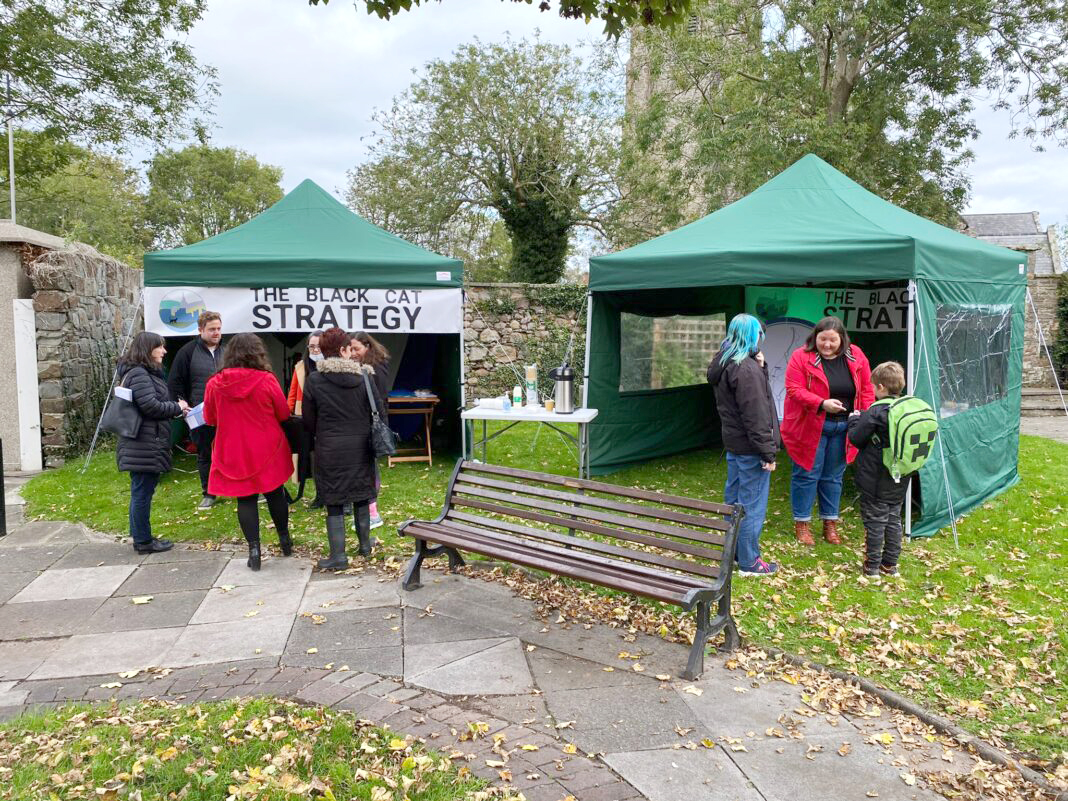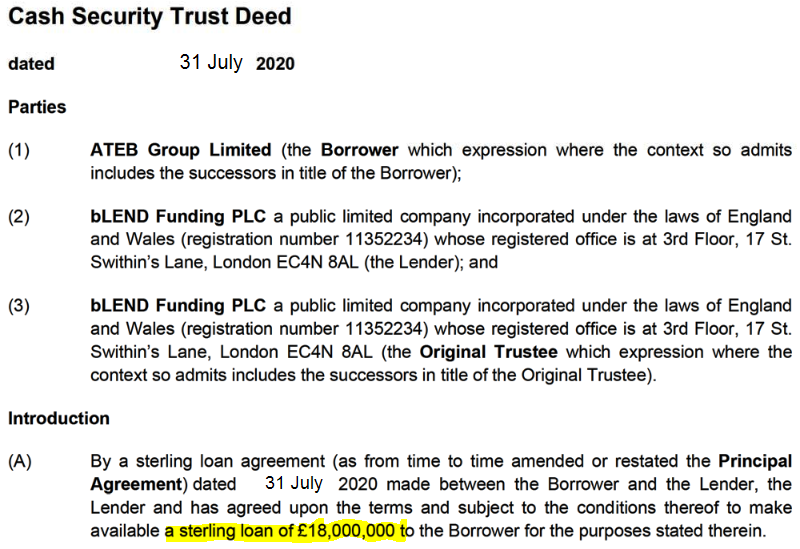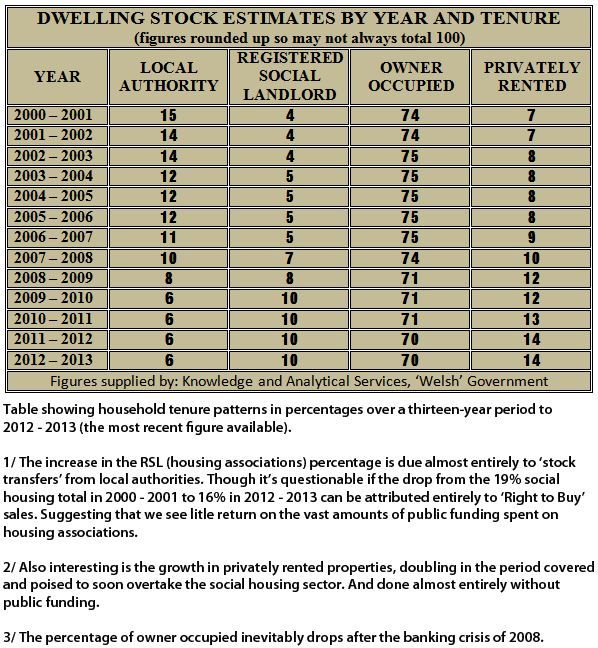INTRODUCTION
![]() Everyone I think accepts that in Wales we have a dysfunctional housing or property sector; one not fit for purpose, and one that certainly doesn’t serve the needs of the Welsh people.
Everyone I think accepts that in Wales we have a dysfunctional housing or property sector; one not fit for purpose, and one that certainly doesn’t serve the needs of the Welsh people.
But I’m not simply talking about holiday homes and English migrants squeezing us out of the private housing market, though that is the biggest problem in rural areas, especially in the west.
No, the issues in Welsh housing go beyond asking £2.2m for a ‘fisherman’s cottage’. There are problems less obvious, that don’t attract such attention. And yet, if these problems were remedied, then the money saved could go towards solving other issues.
In this post I shall deal with two of those problems.
◊
GANGLAND ABERYSTWYTH
There have been persistent reports of trouble in Aberystwyth of a kind that almost beggars belief. I quote from this recent report, “There’s been a number of instances where a fight took place between rival gangs from the midlands (sic), apparently, who were fighting over a turf war.”
The area worst affected is close to the castle, in the Rheidol ward. Here’s a map of that ward, with one address marked with an x on Upper Great Darkgate Street. I’ve done this because I’m going to tell you a little story.
So make yourselves comfortable.

This part of the town, Upper Great Darkgate Street, between Clock Square and the castle, holds fond memories for me. For back in the ’60s it was home to two great pubs, The Angel and The Farmers, next-door to each other.
I sank many a pint in both. And oft-times in wonderful company. I have great memories of Cayo on his accordion leading the ensemble.
Happy days!
The Farmers is closed, but the Angel is still open, but obviously not what it used to be, to judge by this review. Though if they think this is the dirtiest, scruffiest pub in Wales, then the Sheppey family of Pontypool enjoy a very sheltered life.
Note the reference to this pub being “full of drug people”.

The reason you’re traipsing down Memory Lane with me is because, back in June 2019, I was in the vicinity when I came across a strange scene. The road around the clock tower was blocked off by the police and I could see somebody up on a second floor window sill, apparently threatening to jump.
I joined the small throng that had gathered to shout advice to the would-be jumpee. (For next to suspenders and stockings few things get the old Jac adrenalin pumping better than a raucous mob!)
Realising I was going to use this image sent me to the Land Registry website, where I was able to establish that the property in question – No 50 – is owned by our old friends Wales & West Housing.
Here’s the Land Registry title document.
The property was originally bought by Cymdeithas Tai Pumlumon in 1989, which merged with Cymdeithas Tai Dyffryn Teifi in 1993 to form Cymdeithas Tai Cantref. Cantref was eventually swallowed up by Wales & West in 2016.
Which is just before the problems in this part of Aberystwyth started.
By clicking on Cantref: ‘Welsh’ Labour Takeover Challenged? you’ll get more information and links to all my previous postings on the subject.
I used that title in 2016 because Wales & West is the ‘Welsh Government’s favourite housing association. Group CEO Anne Hinchey – who’s never knowingly missed a photo op – is the wife of Cardiff Labour Councillor Graham Hinchey.
Wales & West has an appalling record for dumping petty criminals and drug addicts on Welsh towns and villages. In this news report from January 2018 W&W admits there have been “issues” in Lampeter.
That’s because Wales & West is a business, and housing England’s problems pays well. Which goes hand in hand with W&W rejecting its responsibility to Welsh communities, or Wales in general, and its “Do we have to!” attitude towards the Welsh language.
Though this recent report from the Tivy-Side Advertiser about W&W’s plan to damage a community in north Pembrokeshire makes clear that locals now know exactly how Wales & West operates.

But Wales & West is not alone in causing the kind of problems we see in Aberystwyth. A few other housing associations do the same thing, then there are third sector bodies, and private landlords. Often working together, as we saw in Tyisha, Llanelli.
But what makes Wales & West especially damaging is that it’s the biggest housing association in Wales, and it achieved that position through favouritism and funding from the ‘Welsh’ Labour ‘Government’, and through operating a business model that a more responsible organisation would reject.
Can you imagine a Labour Party election manifesto that read: “We shall increase funding to housing associations and third sector bodies so they can bring into Wales more criminals, drug addicts and families from hell”?
No, neither can I. But it’s what they do.
◊
“MOVING TO WALES”
On Sunday someone drew my attention to this story he’d picked up in KentOnline.
It seems that Kayleigh Parnham can no longer afford to rent a home for herself and her three children in Kent and so, “in a few weeks’ time she will be moving more than 200 miles away to Wales”.
Later we read, “Miss Parnham says a friend who found herself in a similar situation moved to a town in Wales – so she has decided to follow suit, successfully applying for a council house.”
(Though of course “council house” in this instance could mean any kind of social housing, which would include housing association properties.)

The question many of you are now asking is – How does this woman qualify for social housing in Wales? So let’s examine some possibilities. (Here I am indebted to a couple of people who contacted me after I put out this tweet on Sunday.)
The article tells us that Kayleigh Parnham has lived in Kent all her life. This rules out her having local connections with any part of Wales. But it mentions her “friend” who made the move, so is she claiming kinship with this trailblazer and saying she needs to be near relatives?
Because this is a loophole often exploited.
This loophole also explains how a youngster who’s got into trouble is ‘adopted’ by Wales-based do-gooders and then, within months, his extended criminal family appears. And is immediately housed.
Cos there’s good money to be made.
Another scam, rife in coastal areas, is to move your family into a caravan – plenty available, especially in winter – claim “cramped living conditions”, etc, then tell the nice lady from Cwmscwt Housing Association that little Chardonnay is coughing all the time and you’ll soon be offered a nice big house.
Or, if that doesn’t appeal, then find anywhere to live, stick it out for six months and, bingo! – you qualify as ‘local’. Look you.
I even knew one guy, came down from Manchester, pitched a tent on Tywyn beach for himself, his wife, and their 5 kids. An absolute rogue. I used to go drinking with him. I even got talked into ferreting for rabbits one forgettable Sunday.
But these scenarios don’t seem to apply here. It looks as if Kayleigh Parnham, living in Kent, is just waltzing straight into a home in Wales. A country she may never even have visited.
The photo in the article I’ve linked to shows Ms Parnham with her two daughters, but there is a third child, her son, 12-year-old Alex. And as this article from the Daily Mirror informs us, Alex has ‘issues’.

Not only are we taking in a family with no Welsh connections, it looks as if one of the children will need expensive treatment.
Thank God Wales is a wealthy country!
But it’s not just Kayleigh Parnham and the friend who preceded her coming to Wales.
This story carried by CornwallLive is headlined: “Ponsanooth mum might be forced to move to Cardiff after eviction notice”.
I love the use of “forced”. But then, I’d have to be dragged kicking and screaming to live in Cardiff . . . and I’d leg it at the first opportunity.
To misquote that great Swansea poet, Harri Webb. Better a shed in Landore than a mansion in Lisvane.
The issue for mother-of-four Rae Layton in Cornwall is Section 21 notices, which allow a landlord to evict a tenant with just two months notice. Often done to switch that property to Airbnb or to sell as a retirement / holiday home.
Or else the sitting tenant is evicted and the property is rented out again at a greatly increased rent. Which is what seems to have happened to Laura Williams of Penzance, another woman with four children.

One contact on Sunday directed me to the Housing (Wales) Act 2014, and in particular sections 73 and 75. Where we read that Wales has an obligation to house the homeless, no matter where they come from. In some circumstances the obligation extends to those who are intentionally homeless.
This looks like another nice little earner.
Because I bet that a Welsh council or housing association taking in a family from almost anywhere in England will be able to charge the ‘home’ authority more than they could charge local tenants. And the ‘home’ authority won’t mind paying because it’ll still be cheaper than if they’d housed that family locally.
As with housing criminals, drug addicts, neighbours from Hell, it’s a business model.
But what about local people waiting for social housing, who see people with no local connections being housed ahead of them time after time after time, because they are “priority cases”?
I don’t wish to appear heartless, these women obviously need help. But they should not be our problem. Section 21 evictions are happening all over England – do we take them all in?
◊
CONCLUSION
It doesn’t matter which vantage point you take, or which sector you focus on, the housing market in Wales is screwed.
In the village where I live every property that comes up for sale is bought by an English buyer. Either as a holiday home or somewhere to retire to.
There’s little demand for social housing because there is no employment locally, so young people leave. This explains the closure of the village school, the age profile, and the language shift.
I was only able to buy the house I live in thanks to Right to Buy legislation. This provided the only chance for most locals to buy a home in many parts of Wales. Especially coastal and rural areas.
But the socialists in Corruption Bay did away with Right to Buy. Hypocrites, many owning two or three properties. That’s ‘socialism’ for you.
A country with a modicum of self-government becoming increasingly less accommodating to its native population suggests either a malevolent guiding hand or incompetence such as no nation should be expected to tolerate.
∼
Radical action is needed to put things right. Here are some suggestions:
- Instead of tinkering with council tax rates that councils will never have the balls to implement, the ‘Welsh Government’ should itself impose a 500% national surcharge on all holiday homes.
- Airbnb and similar operations should be banned from Wales.
- Canada recently introduced a two-year ban on most foreigners buying domestic property. Denmark and New Zealand have similar legislation. Why can’t something similar be done in Wales?
- Failing this, then we must have a split market such as operates on the Channel Islands. This sees most properties reserved for local buyers, with a smaller ‘open’ market accessible to everyone.
- Something that could be implemented tomorrow – and should be – is the ‘Welsh Government’ ceasing to fund housing associations and third sector bodies that bring in criminals and other undesirables from England. (A practise that should surely compete with Einstein’s [alleged] definition of insanity.)
- Close the loophole that allows the victim of a greedy landlord in the bucolic idyll of Scrotum Parva to qualify immediately for social housing in Wales. This is England’s problem, not ours.
- Make local connection the overriding qualification for social housing in Wales. And someone has to have lived in Wales for at least 5 years before they qualify as ‘local’.
The options are endless for those with imagination and the will to implement the kind of legislation Welsh people need. Regrettably, both imagination and the will to act in the nation’s interests are alien to the political class that claims to be running Wales.
But something must be done to straighten out a housing sector currently working against Welsh interests; otherwise Welsh people becoming strangers in their own country will be perfectly justified in taking matters into their own hands.
Finally, and this should go without saying – don’t vote for a socialist party tomorrow. Vote for a party that is uncompromisingly Welsh or, seeing as these are local elections, give your vote to a decent independent candidate.
♦ end ♦


























